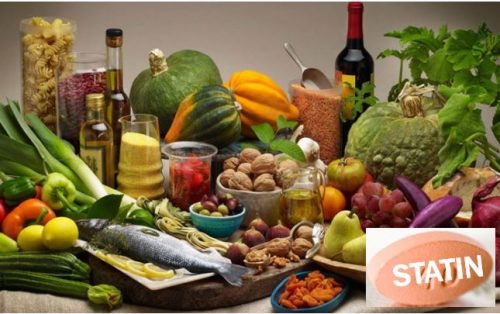Statins work better for people who follow a Mediterranean diet, a study showed. A diet based on Mediterranean principles boosts the effects of these medications. Patients who have already had a stroke or heart attack benefit the most. This is what researchers from the Istituto Neurologico Mediterraneo Neuromed in Pozzilli, Italy found.
The researchers wrote about their study and findings in the International Journal of Cardiology (citation below).
The Mediterranean diet includes an abundance of vegetables, legumes, cereals, olive oil, fish, and fruit. It also includes wine in moderation. The diet is low in dairy products and meat.
First author, Marialaura Bonaccio, an Epidemiologist at the Department of Epidemiology and Prevention, said:
“We found that statins and Mediterranean Diet together were more effective, as compared to one or the other considered separately, in reducing the risk of cardiovascular mortality. Likely, a Mediterranean diet facilitated the beneficial effect of statins, that in our real-life study were generally used at low doses.”
The research team also analyzed this positive interaction’s potential underlying mechanisms between eating habits and drugs. Prior studies had barely explored the mechanisms that underlie this interaction.
Statins + Mediterranean diet reduce subclinical inflammation
Co-author Licia Iacoviello said:
“The favorable combination of statins and Mediterranean Diet appeared to act, rather than on cholesterol levels, by reducing subclinical inflammation, a condition that predisposes to a higher risk of illness and mortality.”
Iacoviello is a Professor of Hygiene at the University of Insubria. She is also head of the Laboratory of Molecular and Nutritional Epidemiology at the Department of Epidemiology and Prevention.

High levels of subclinical inflammation double the risk of mortality among stroke or heart attack patients. Therefore, Prof. Iacoviello added, this finding is of particular interest.
When something is ‘subclinical,’ it is not severe enough to present readily observable or definite signs.
Giovanni de Gaetano, Director of the Department of Epidemiology and Prevention, said:
“Our data suggest that we should focus more on the possible interactions between food and drugs, an aspect largely neglected in epidemiological research. Of course, controlled clinical trials will be needed to clarify these findings.”
“If our data will be confirmed, new therapeutic possibilities could be designed for those who have already had a cardiovascular event, allowing a better modulation of the pharmacological intervention in relation to life habits. This is a new aspect of personalized medicine.”
Citation
“Interaction between Mediterranean diet and statins on mortality risk in patients with cardiovascular disease: Findings from the Moli-sani Study,” Marialaura Bonaccio, Licia Iacoviello, Marialaura Bonaccio, Marialaura Bonaccio, Augusto Di Castelnuovo, Giovanni de Gaetano, Simona Costanzo, Mariarosaria Persichillo, Maria Benedetta Donati, Amalia De Curtis, and Chiara Cerletti. International Journal of Cardiology (2018). DOI: https://doi.org/10.1016/j.ijcard.2018.11.117.

